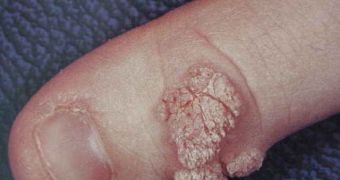A new report from the federal Centers for Disease Control and Prevention estimated that over one quarter of the American women (26.8 %) aged 14 to 59 are infected with a sexually transmitted virus that can provoke cervical cancer (this number is translated to 20 million).
In young women, aged 20-24, the prevalence was even higher, roughly 45 %; so young, sexually active women are confronted with the greatest risk of infection. "We expected the prevalence of any HPV (human papillomavirus) infection would be high and that's what we found," said lead author Dr. Eileen Dunne, of the CDC.
Only 3.4 % of the women presented infections with one of the four HPV strains against which a new vaccine is effective. "But that doesn't mean the vaccine should be written off," said Dr. Yvonne Collins, an assistant professor of gynecologic cancer at the University of Illinois at Chicago. "For one thing that relatively small percentage corresponds with a lot of women - about 3 million, according to the report. And it does not include those with past infections that have cleared up." said Collins.
The new research, which was made on a number of 1,921 subjects, is much more comprehensive than previous researches that employed smaller samples that found higher percentages of women with HPV strains targeted by the vaccine and lower prevalence of HPV amongst young women. "The results should not be interpreted to mean infection prevalence has changed in recent years." said Dunne.
Low-risk strains of HPV provoke genital warts and non-cancerous infections on the cervix, and often cure without treatment but some high-risk forms can inflict cervical cancer. "HPV prevalence is thought to be high in men as well, but none were studied", said Dunne.
Yearly, about 11,150 American women are detected with cervical cancer, and about 3,670 die from it. The deadly cases are higher in developing countries where Pap tests for the detection of this type of cancer are not easily available. The vaccine against HPV is effective for women under 26, being developed against two HPV strains responsible for about 70 % of cervical cancer cases, and two other strains that provoke 90 % of genital wart cases. "Other vaccines are in the works to protect against other HPV strains," Collins said. "The study underscores the need for young women to get vaccinated, and to get routine Pap tests," said Dr. Howard Jones, a gynecologic cancer specialist at Vanderbilt University.

 14 DAY TRIAL //
14 DAY TRIAL //